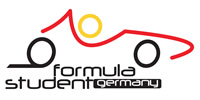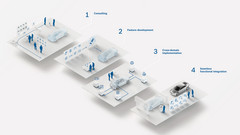Feature-based, modular development approach for customized complete vehicle solutions
In recent years, the requirements in vehicle development have changed considerably. Stricter safety, emission and CO2 regulations, but above all additional development scopes such as electrification of the drive train, automated driving and connectivity features can only be implemented via a high degree of networking of components or fundamentally new E/E architectures. In development, the focus is on function; functional enhancements are no longer synonymous with the integration of new components.
The starting point for development is the definition of the use cases that are to be covered by the vehicle. From this, features are derived - the functional characteristics that the vehicle must have in order to realize a particular use case. This then determines the scope of the individual functions that must be mapped by software and hardware in the course of system development and which, in functional interaction, produce the features, the DNA and the desired behavior of the vehicle.
In order to continue to master the complexity of overall vehicle development and to be able to provide customers with targeted support as a development partner in the future, Bosch Engineering has expanded its service portfolio for the entire development process and adapted it to the changed conditions. The new feature-based development approach relies heavily on methods and tools of model-based system development. This enables the holistic development of features while considering all interfaces between the individual subsystems and components as well as their mutual interactions, taking into account requirements relating to cybersecurity, functional safety, and diagnostics.
Vehicle Systems Solutions (VSS) comprises four modules:
- Consulting
- Feature development
- Cross-domain implementation
- Functional integration
In this way, Bosch Engineering creates the conditions to make the extensive know-how in feature development, gained through numerous development projects, available to all our customers and to tailor this support to their individual needs.
Consulting
Already during the conception of a new vehicle, the cornerstone for the later success of the project is laid. But also many cost- and time-intensive problems, which only become apparent later in the development process, can be traced back to errors in this phase. The conceptual design task is also becoming increasingly challenging for established OEMs because they often have to develop new technologies that are not part of their traditional development content in order to cover new use cases or new features. In addition, more and more new OEMs are entering the market which come from other industries and do not yet have a routine in vehicle development.
In order to provide these customers with the best possible support, Bosch Engineering has expanded its range of services to include consulting services that cover the entire product development process. They start as early as the conception of the vehicle. In this early phase of the project, it is determined together with the customer what features the new vehicle should have and how these should be designed to meet the characteristic brand values, the brand DNA, so to speak. On this basis, together with the OEM, Bosch Engineering determines which use cases the new vehicle must cover and, as a result, which vehicle features are to be provided for realization. The methods used in this context include user analyses (user experience, UX) and benchmark comparisons. The result is a compilation of the functions required for the presentation of the features and a first rough concept of the resulting E/E vehicle architecture.
The customer can then work with Bosch Engineering to move directly to the proof of concept or feasibility phase of his new product. Due to the high system complexity of today's vehicle architectures and for reasons of development efficiency, new development approaches such as model-based system development already play a major role in this phase. If required, Bosch Engineering provides support in the form of consulting services aimed at smooth initialization and implementation of the new processes, methods and tools at the customer's site.
Feature development
As mentioned at the beginning, features can no longer be realized in the future by integrating individual additional components, as has been the case in the past, but are the result of networking a large number of sensors, actuators and control units in the vehicle's E/E network. With VSS, Bosch Engineering is entering feature development earlier and at a higher level of abstraction. In previous domain-oriented development, the service of Bosch Engineering only started when a specific specification sheet was available, and a defined system or component development was derived from it. With VSS Bosch Engineering now also covers the area between feature conception and creation of specifications. This process includes, among other things, the transformation of a feature into individual functions, the analysis of which modules in the E/E architecture can best execute the functions or parts thereof, and the definition of the specifications for the individual software and hardware modules. Even in the early phase of feature development, functional security, cybersecurity and diagnostics are taken into account in addition to the technical requirements, so that feature development results in holistically coordinated specifications for the software and hardware. In the following process stage Bosch Engineering takes care of the development of the feature in software and hardware and also create the appropriate test procedures. Customers benefit from a fast and efficient product development through a target-oriented process and from a detailed component specification, which considerably accelerates and facilitates the purchase of the necessary supplier components.
Cross-domain implementation
Based on the consistent and complete specification of the requirements for the overall vehicle architecture, the individual software functions distributed on the different ECUs in the vehicle can be defined, programmed and implemented. Since the functions can no longer be assigned to individual systems or components, their development is also no longer based on classical domains. Rather, implementation becomes a comprehensive task in which the experts of the individual development departments work together on the function. In this development step Bosch Engineering takes over the complete project management. This includes, for example, steering the project teams, defining and controlling development milestones, functional testing and extends to the implementation of diagnostic functions.
Seamless functional integration
The area of functional integration comprises the implementation and testing of individual functions in software and hardware as well as their integration and validation at subsystem and overall vehicle level. In this context it is ensured, for example, that the infrastructure required for the implementation of the feature, such as communication and on-board power supply systems, is designed accordingly and that the integration is validated accordingly. Bosch Engineering takes over the cross-domain integration into the E/E overall vehicle architecture and realize the validation. This includes simulations, test bench investigations and vehicle tests.
Flexible service modules
The VSS portfolio of Bosch Engineering has a modular structure: Customers can put together individual components of the service catalog flexibly and receive the level of support they need for their development task. The scope ranges from partial support for special questions to complete services, where Bosch Engineering carries out the entire feature development. In any case, the customers receive everything from a single source, because Bosch Engineering takes care of the complete development process from consulting, feature development and functional integration to validation on our own component, drive and vehicle test benches. During development, the company relies on the extensive knowledge gained in numerous projects, which is supplemented, if necessary, by the extensive know-how of the entire Bosch Group.








